I Never Bought the Toner Hype—Then These 11 Products Changed My Skin
The ultimate skincare balancing act.
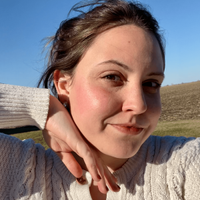
Gabrielle Ulubay
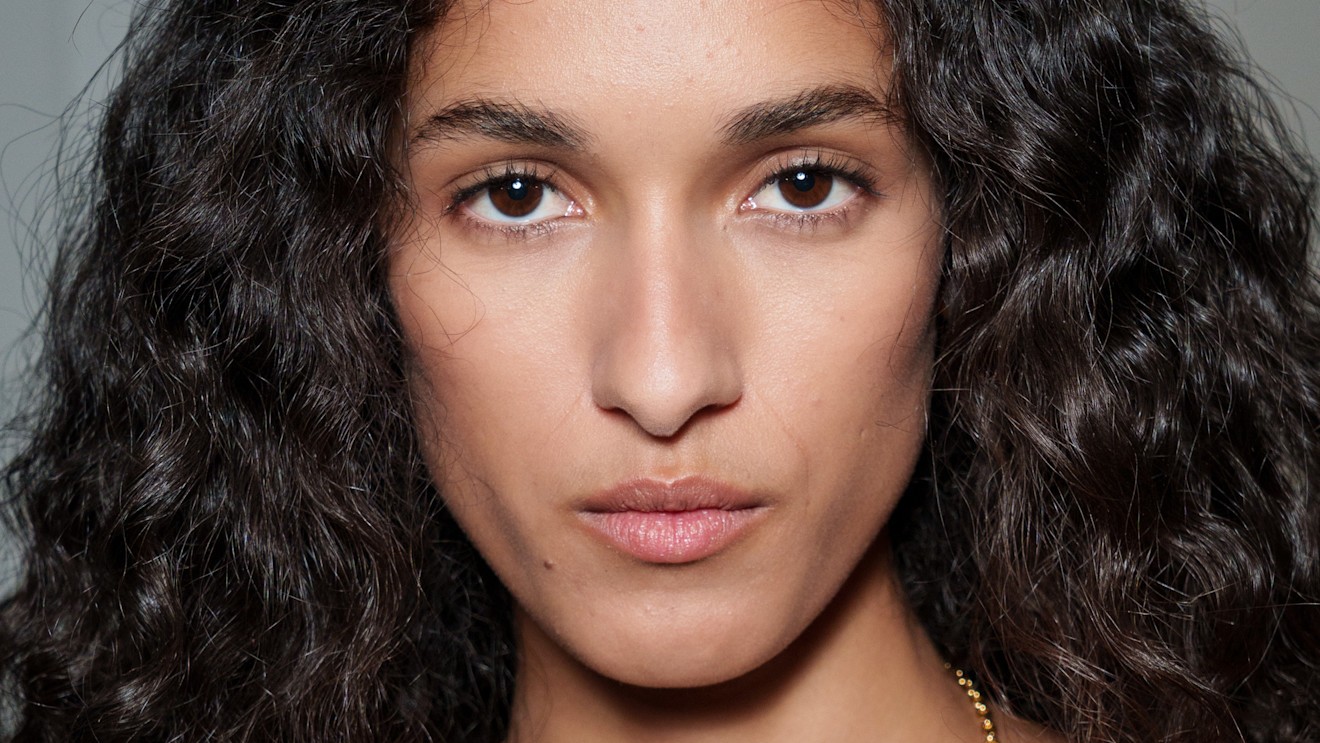
Select the newsletters you’d like to receive. Then, add your email to sign up.
You are now subscribed
Your newsletter sign-up was successful
Want to add more newsletters?

Delivered daily
Marie Claire Daily
Get exclusive access to fashion and beauty trends, hot-off-the-press celebrity news, and more.

Sent weekly on Saturday
Marie Claire Self Checkout
Exclusive access to expert shopping and styling advice from Nikki Ogunnaike, Marie Claire's editor-in-chief.

Once a week
Maire Claire Face Forward
Insider tips and recommendations for skin, hair, makeup, nails and more from Hannah Baxter, Marie Claire's beauty director.

Once a week
Livingetc
Your shortcut to the now and the next in contemporary home decoration, from designing a fashion-forward kitchen to decoding color schemes, and the latest interiors trends.

Delivered Daily
Homes & Gardens
The ultimate interior design resource from the world's leading experts - discover inspiring decorating ideas, color scheming know-how, garden inspiration and shopping expertise.
I'll be honest: I always thought toner was a bit of a gimmick. Do I really need another step in my skincare routine? Some dermatologists swear by it; others have told me it's a nice-to-have, not a need-to-have, so I historically opted for simplicity. But! Then I was tasked with finding the best toners of all time for this specific story—and my tone about toner totally changed. It's now one of my favorite skincare products.
"A toner balances the skin after cleansing, removes any leftover residue, and preps the skin to better absorb serums and moisturizers. Depending on its ingredient deck, it can also mildly exfoliate, brighten, refine texture, plump fine lines, and lock in hydration," explains Candace Marino, a Beverly Hills-based skincare expert widely known as The LA Facialist.
Understanding the impact of a toner, requires a basic understanding of the skin's microbiome. "The microbiome strengthens the skin's defensive barrier, protecting against pathogens as well as maintaining moisture levels and regulating our immune response," explains Ava Shamban, MD. “If the pH of the skin is too acidic or too basic, the normal (and necessary) bacterial population could be affected." The brilliance of toner, then, is that it can maintain and adjust the skin's pH after cleansing. If your skin's pH is off, toner can "become key to the health and survival of the skin microbiome,” she explains.
Convinced? You should be. Discover the best toners on the market for all skin types, as recommended by editors and experts, ahead.
The Best Toners
- The Best Toner Overall: Beauty of Joseon Glow Replenishing Rice Milk Toner
- The Best Toner For Glow: Biodance Gel Toner Pads
- The Best Do-It-All Toner: Vintner's Daughter Active Treatment Essence
- The Best Toner for Sensitive Skin: Botnia Rose Water Toner
- The Best Toner for Dull Skin: Murad Environmental Shield Essential - C Toner
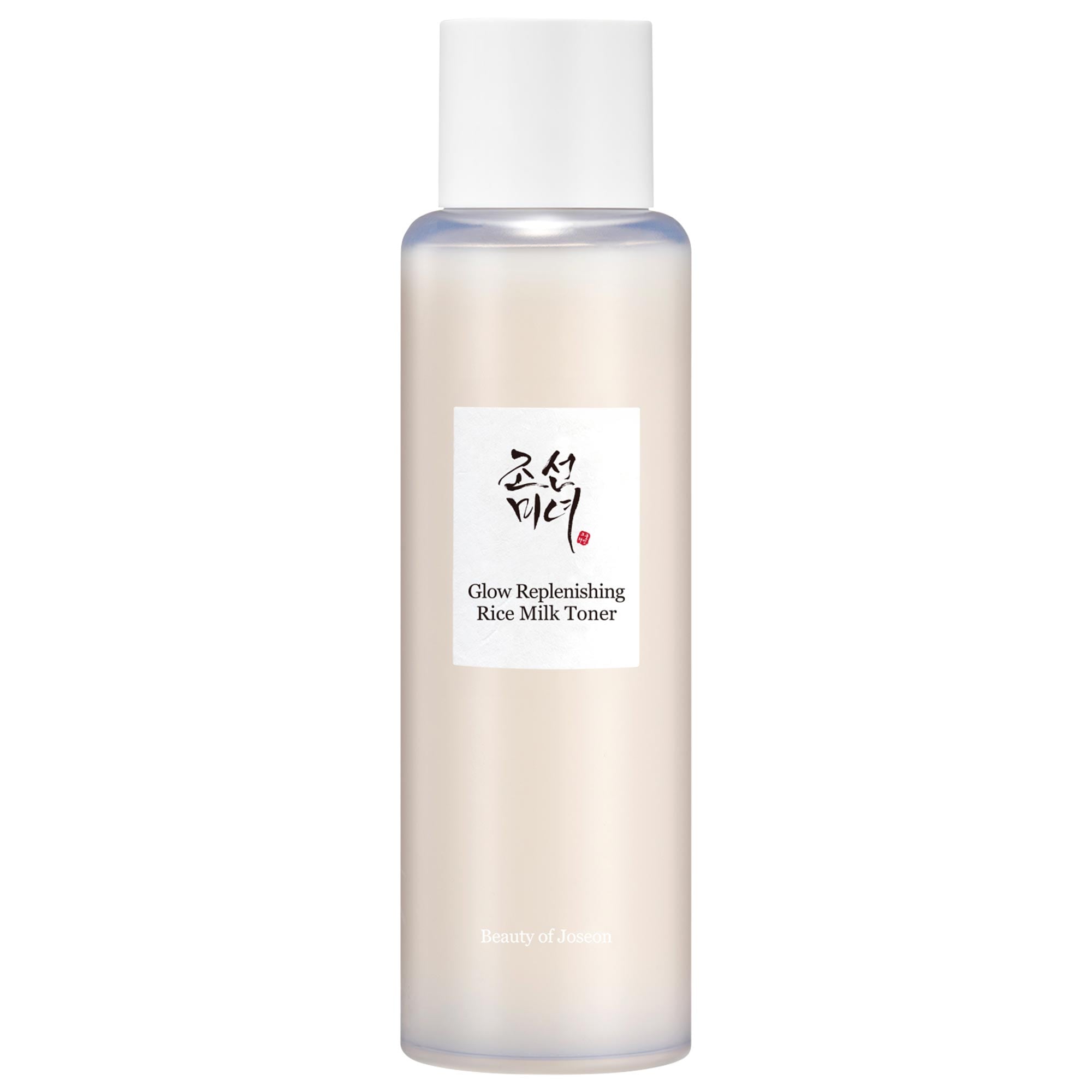
Available in the United States at long last, Beauty of Joseon's Glow Replenishing Rice Milk features a dual-layer formula with a moisture layer for intense hydration and a powder layer that'll help absorb oil and purify your pores. Shake well to blend, then swipe this affordable, milky magic on to start reaping its many benefits. You'll notice an immediately fresher complexion that never feels greasy, as well as hydration that lasts all day long.
Size: 5.07 oz.
Skin Type: Oily; Combination; Normal
Key Ingredients: Rice extract (radiance boosting); Rice amino acid (delivers antioxidants and moisture); Sebum control powder (purifying)
What I Love: Affordable; Dual-phase formula tackles multiple skin issues; Skin feels dewy and soft after use; Absorbs quickly
What I Don’t: Nothing
Review for MC: "There are so many fancy toners out there, but sometimes you just want something that'll get the job done. And okay, okay...still feel a little fancy. The second that Beauty of Joseon's Rice Milk toner was available in the US I snagged a bottle, having long heard how great it was. I'm happy to report that it's just as amazing as anticipated, and maybe even more so. I love to softly press it into my skin before bed (I skip the cotton, usually!). It sinks in quickly so I can continue with my skincare routine and I always wake up a little more glowy." — Sophia Vilensky, Contributing Beauty Writer
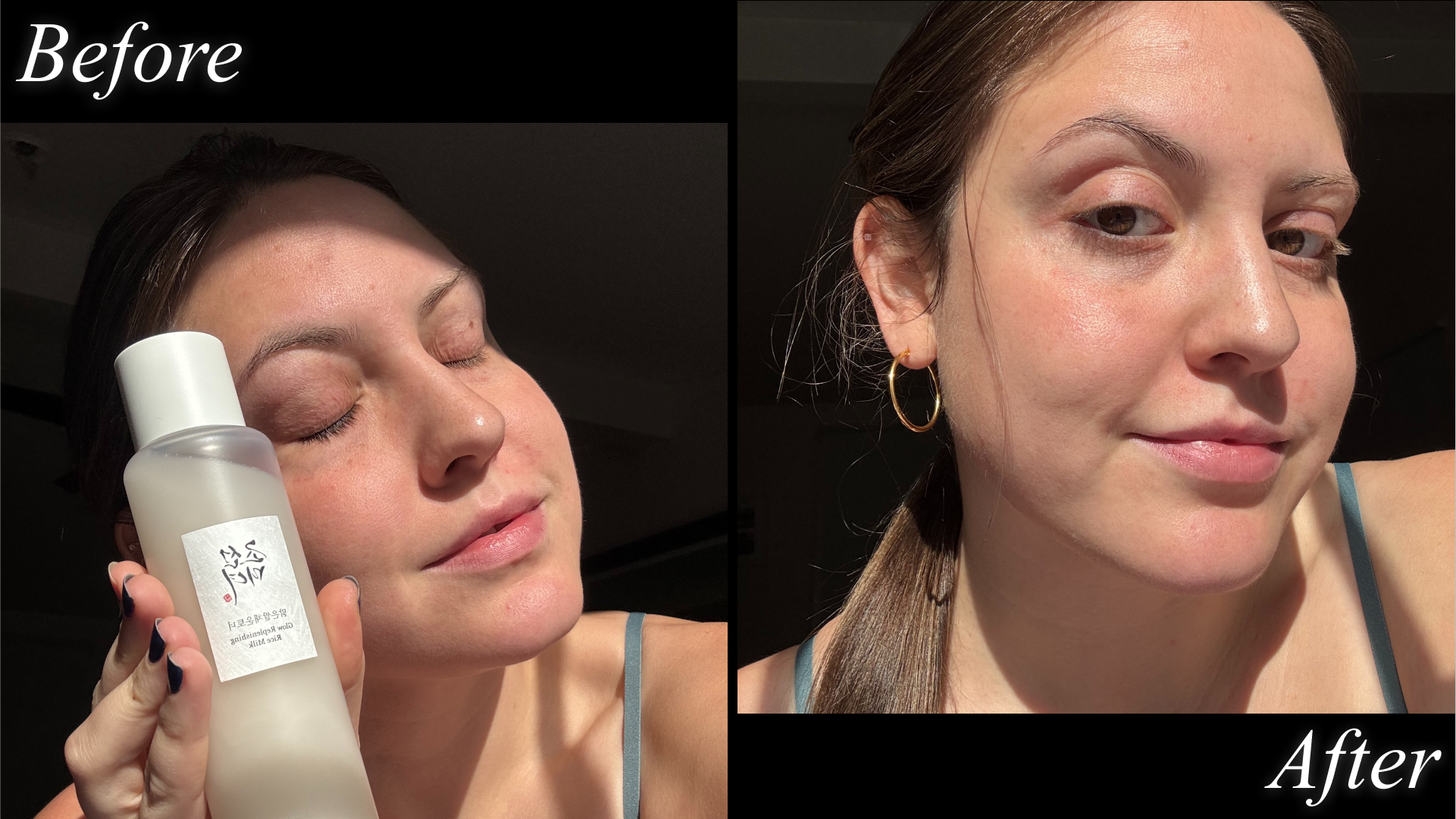
Sophia Vilensky is a huge fan of K-beauty brand Beauty of Joseon's Rice Milk Toner. FYI: She took the first picture after she shook up the dual-layer formula.
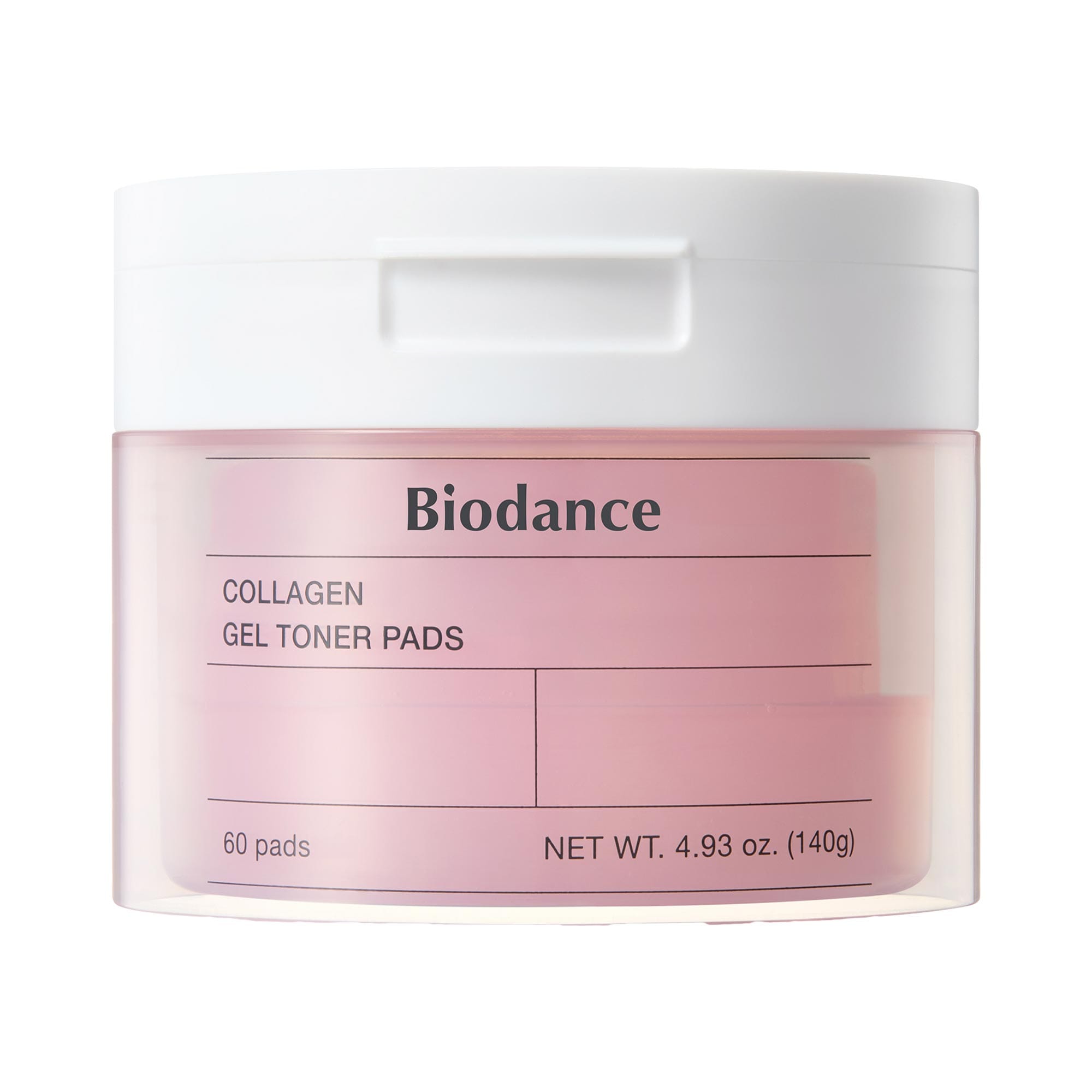
Behold: A pink jar of soft fabric pads delicately coated in a gel essence that you need only sweep across your face to achieve a dewy glow. Biodance's Collagen Toner Gel Pads are infused with collagen water to visibly firm and tighten the skin. They feel so nice to use, and leave you with a radiant and smooth complexion.
Size: 60 pads
Skin Type: Normal; Dry; Combination
Key Ingredients: Low-molecular weight collagen (pore minimizing); Oilgo hyaluronic acid (hydrating); Galactomyces (improve texture and tone)
What I Love: Fun to use; Refreshing; Innovative; Skin feels firmer almost immediately
What I Don’t: Compared to the experience of adding essence directly to a cotton pad, you can't help but get your hands a little sticky when using these
Review for MC: "Did you know toner can be fun? As long as it arrives via a tub of gel pads and a tiny tong to grab them. What's even more fun, if you can believe it, is how great these feel on your skin: refreshing and soft and juicy in a way that you know will impart impressive dewiness. My skin immediately feels firm, but not in an I'm-too-clean, tight way, every time I use one." — Sophia Vilensky, Contributing Beauty Writer
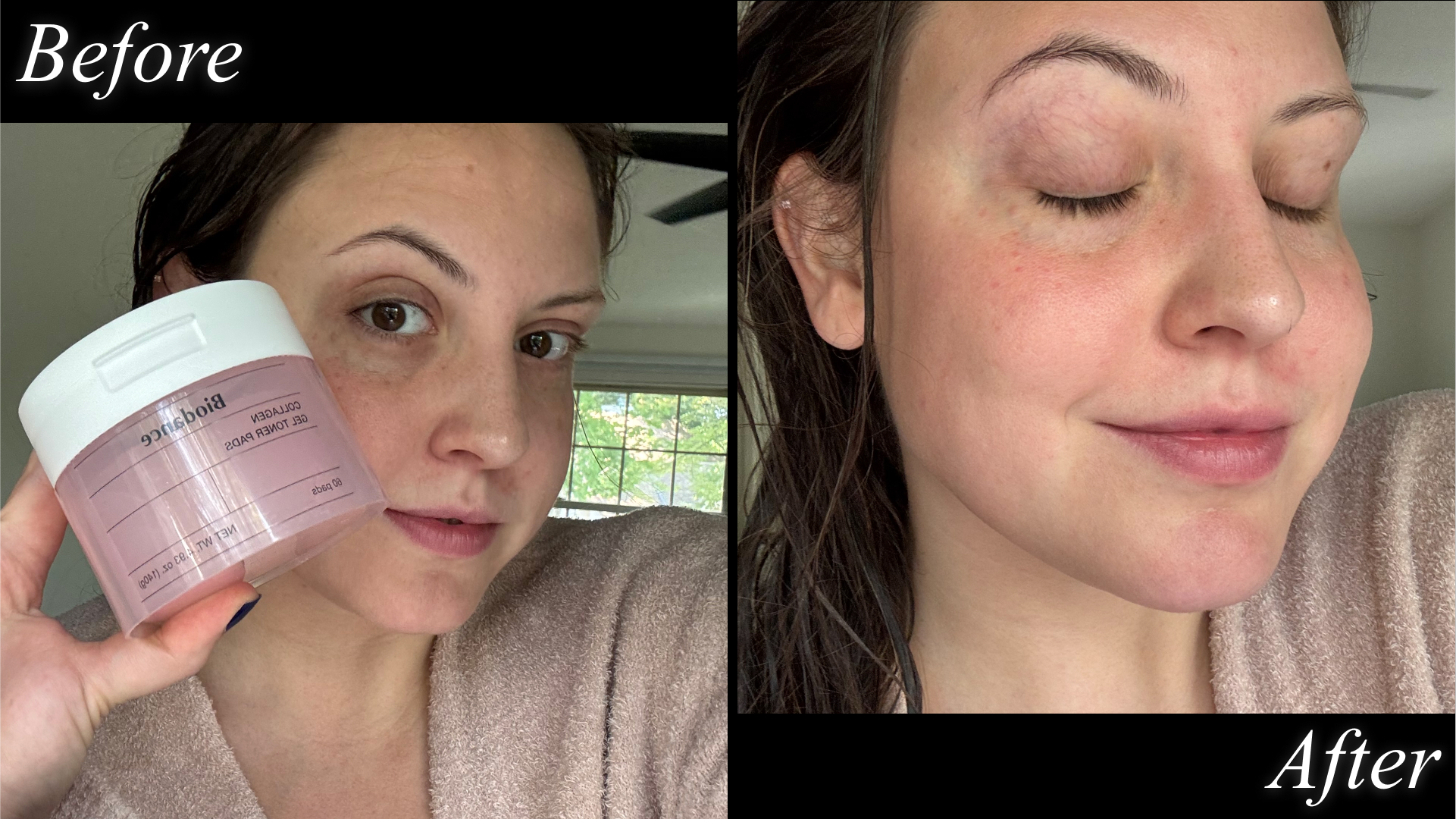
Biodance's toner pads work beautifully. They also come in a pink tub with a tiny spatula, which makes them all the better.
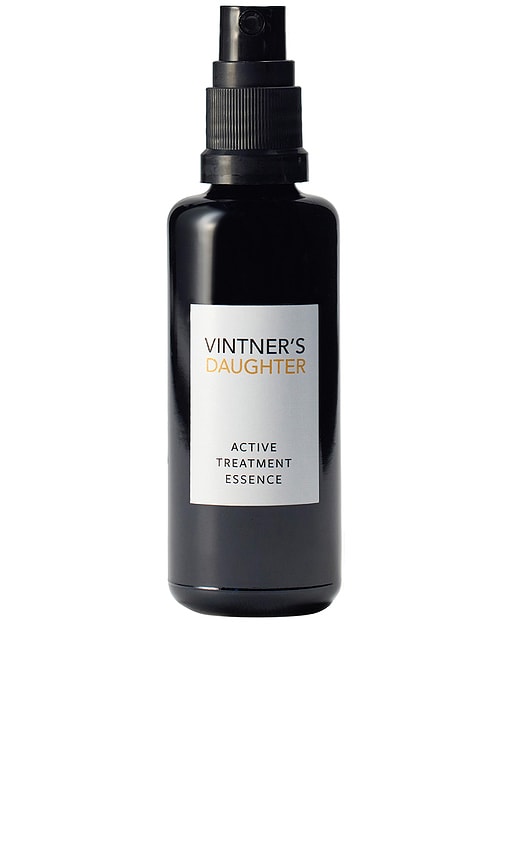
If you're looking for a toner that does it all, Vintner's Daughter is the one for you. "While technically an essence, this treatment from Vintner’s Daughter is more like eight products in one—the brand actually calls it a 'facial in a bottle.' And we can confirm that it lives up to the hype, based on how soft, toned, and glassy our complexions look," wrote the Marie Claire editors when naming it the Best Toner/Essence in the 2025 Skin and Hair Awards. "The result is an essence that also functions as a vitamin C serum, hyaluronic serum, prebiotic serum, micro-exfoliator, a collagen stimulator, a skin barrier supporting treatment, and a pH-balancing toner in one lightweight product."
Size: 1.7 oz.
Skin Type: All
Key Ingredients: Micro and mini hyaluronic acids (hydrating); Stabilized vitamin C (brightening); Enzymes and plant stem cells (visibly fortifying)
What I Love: Thoughtful formulation; Does it all; A host of impressive ingredients
What I Don’t: Expensive (but I assure you there's a good reason for the price—every bottle takes *five weeks* to make and the ingredients are top tier)
Review for MC: "Earlier this summer, I was struck with a terrible bout of poison ivy that covered my face, stomach, and right leg (I'm not sure why the left one was spared, but I digress). When I felt comfortable getting back into a skincare routine after a few weeks of pure calamine lotion, I wanted to keep it simple while doing everything I could to 180 my neglected complexion...so I turned to Vintner's Daughter. I love the oil, of course, but I this essence should be just as highly acclaimed. With every fine spritz my skin feels better in every way. That might be crazy to say, but it's true. It also made it feel truly bouncy and hydrated after a dangerously drying couple of weeks." — Sophia Vilensky, Contributing Beauty Writer
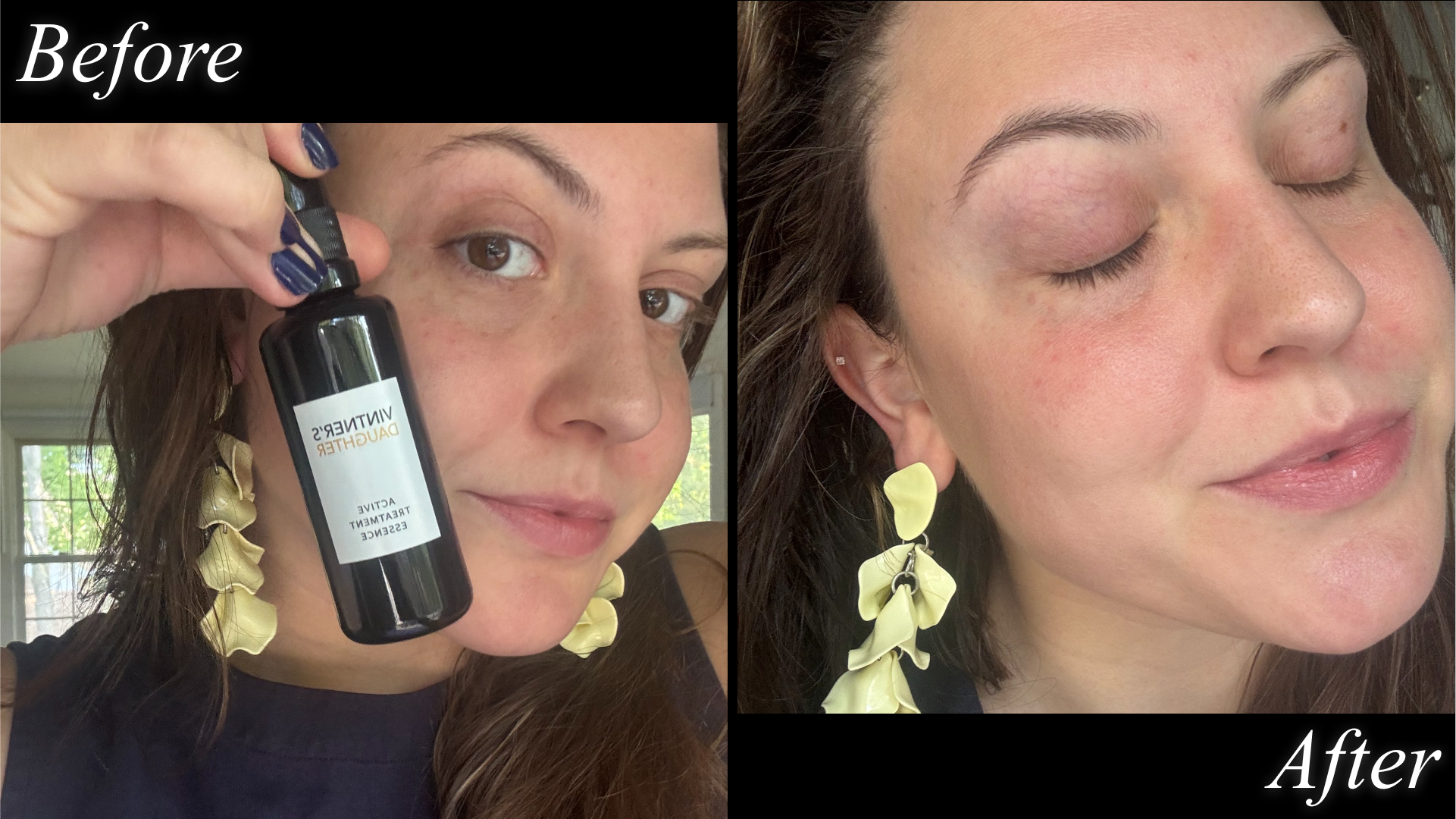
Vintner's Daughter's Active Treatment Essence helped Sophia Vilensky through a rough poison ivy incident—not that she didn't swear by it before that, too.
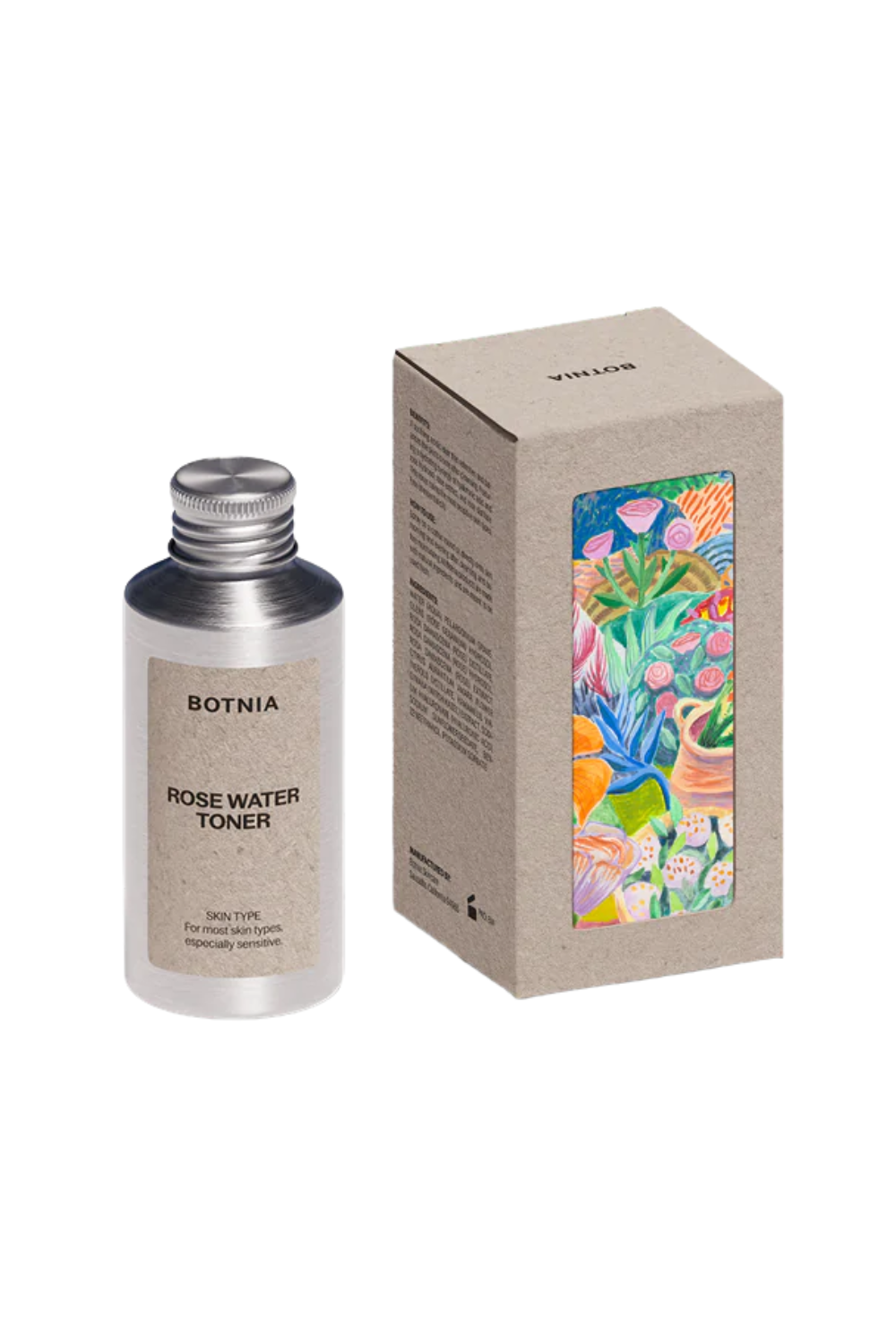
With this hydrating, refreshing, and essential-oil-free toner, Botnia invites you to "stop and smell the (ultra-soothing) roses." Made to calm even the most sensitive skin, this stunning and straightforward concoction combines rose—the brand sources all its botanicals from local and organic farms—and witch hazel to balance skin bacteria and pH levels while also supporting a healthy microbiome.
Size: 3.4 oz.
Key Ingredients: Rose and rose geranium hydrosols (tightening and soothing); Witch hazel (astringent that helps eliminate excess sebum)
Skin Type: All, but its especially great for sensitive skin
What I Love: Ingredients are locally grown; Herbalist-involved formulation; Lovely and delicate natural rose scent
What I Don’t: Nothing
Review for MC: "I've been using this toner for years, and it never fails to provide the sweetest moment of self love when I spritz my sensitive skin and breathe in the delicate scent. All the goodness continues afterward, when I'm left with a balanced skin tone and overall refreshed feel." — Sophia Vilensky, Contributing Beauty Writer
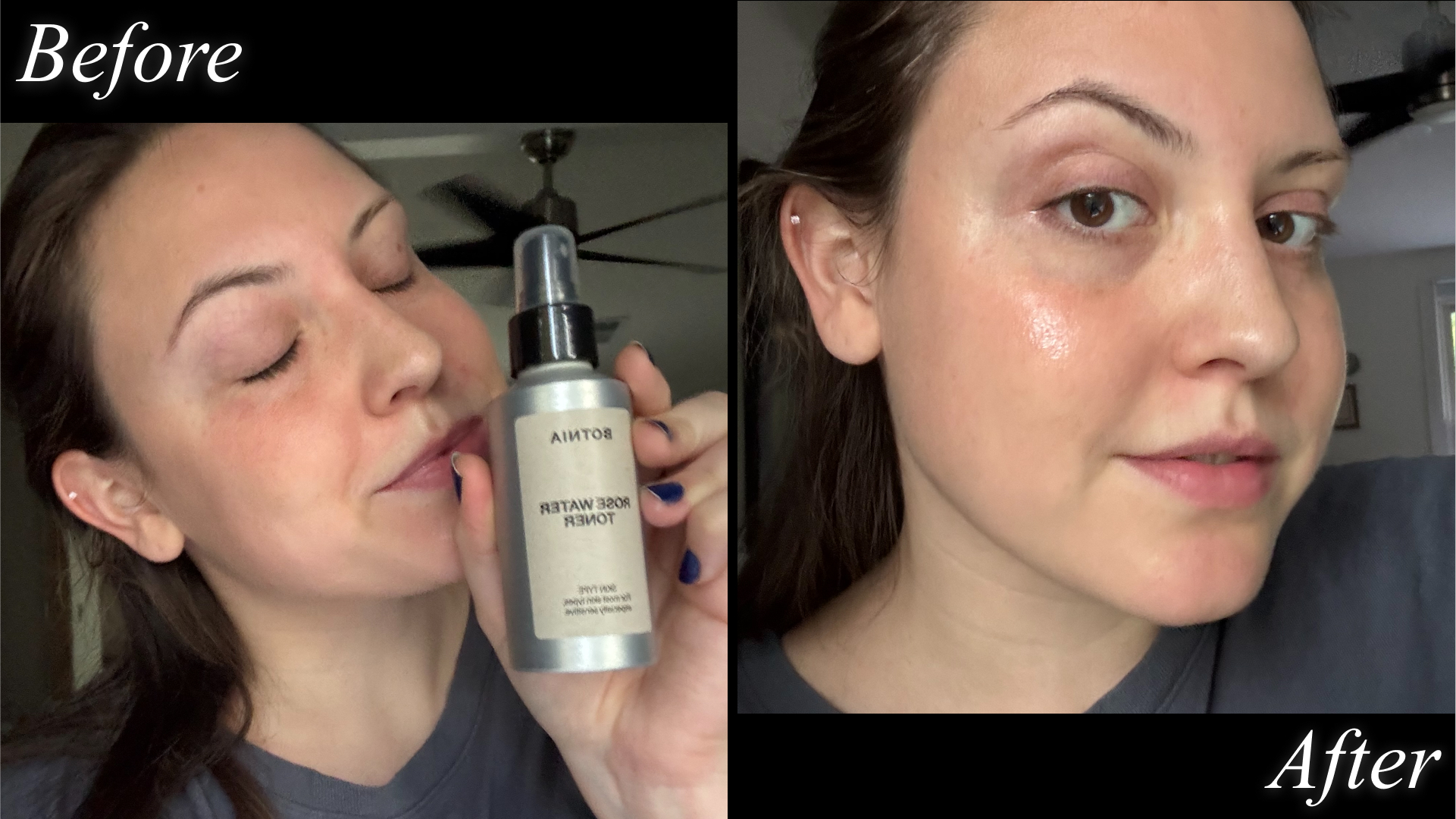
If you can't make it to a rose garden, try Botnia's Rose Water Toner. Doesn't it look like Sophia Vilensky was touched by morning dew, too?
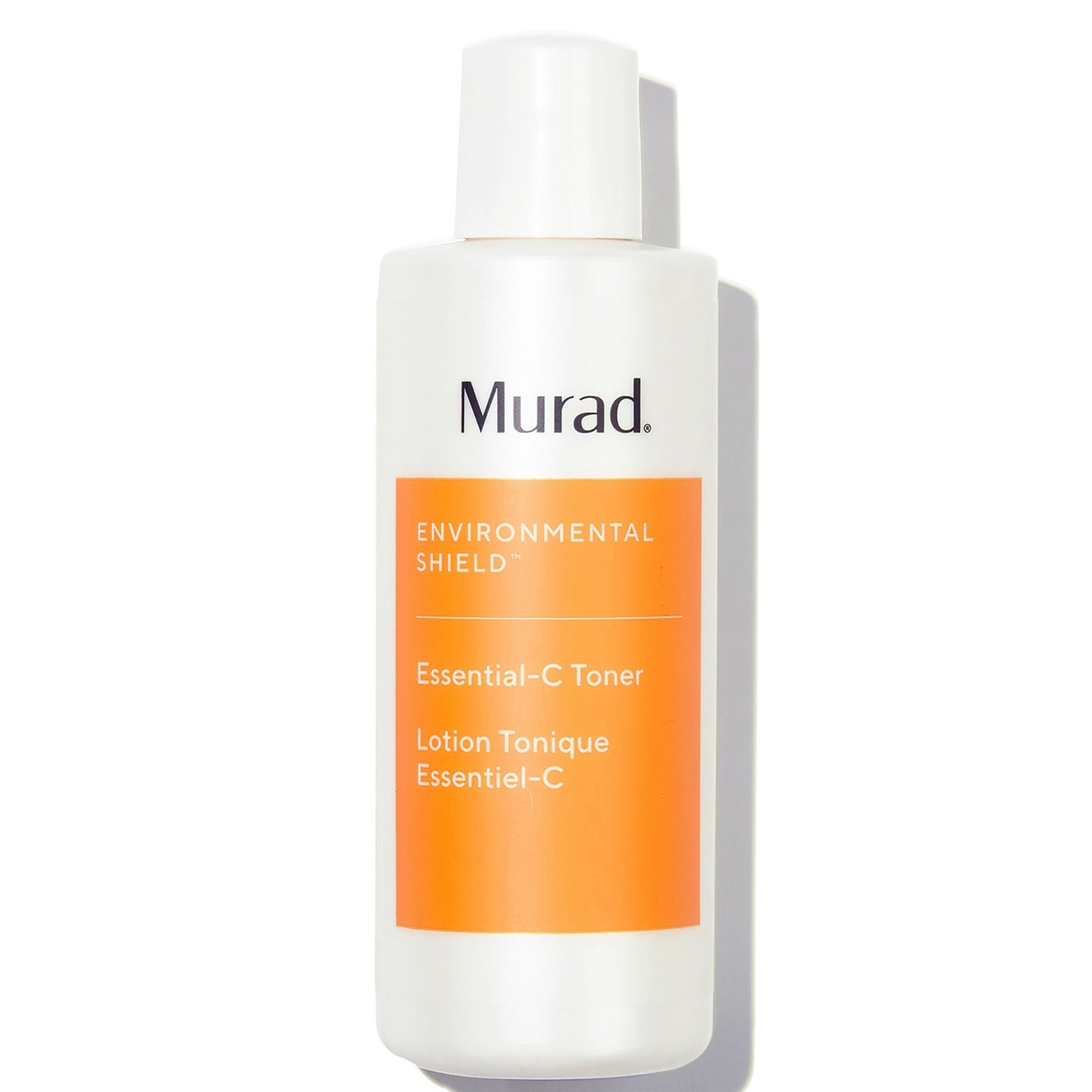
This lightweight toner has something for everyone, whether you have dry, sensitive, or oily skin. I've sworn by it for years, no matter what state my skin is in, and I've even used it on my chest and back. It contains hydrating ingredients like castor oil, brightens via vitamin C, and even incorporates witch hazel, which is known for its acne-fighting properties. My skin always looks brighter and more even after just a few days of using this, and one bottle lasts for months on end.
Size: 6 oz.
Skin Type: All
Key Ingredients: Vitamin C (brightening); Witch hazel; Castor oil
What I Love: Editor-approved; Evens skin tone; Infused with vitamins and antioxidants; Lightweight; a A little goes a long way
What I Don’t: Some reviewers feel that it leaves them looking shiny
Review for MC: "When I need a glow boost, this is my go-to. The brightening, Vitamin C-infused formula is lightweight enough to wear all summer long, no matter how hot or humid it is outside, and it never breaks me out. With consistent use, it makes my skin tone more even, minimizing the appearance of acne, hyperpigmentation, and scarring. " — Samantha Holender, Senior Beauty Editor
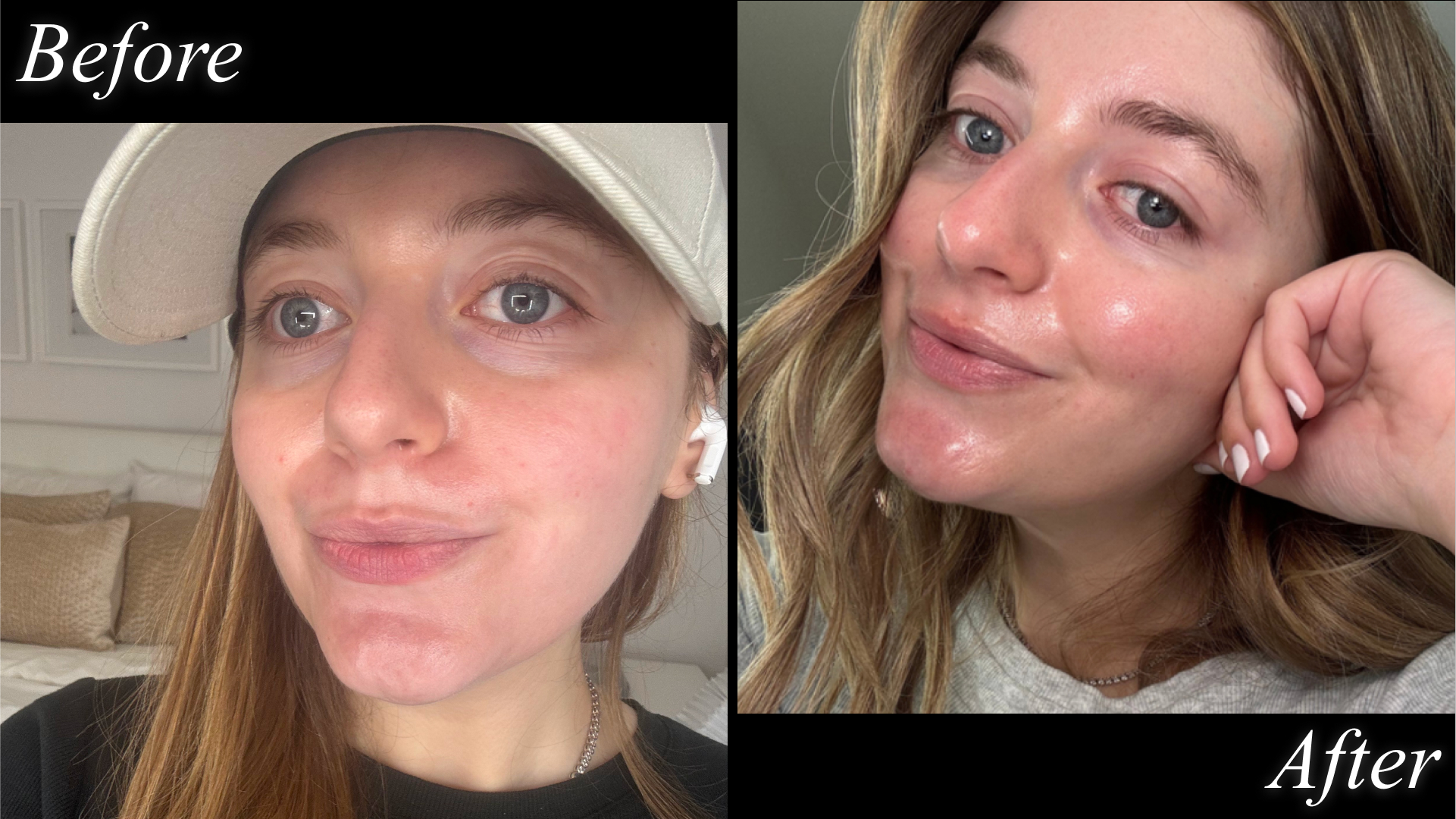
For years, Samantha Holender has returned to the standby Murad Environmental Shield Essential - C Toner.
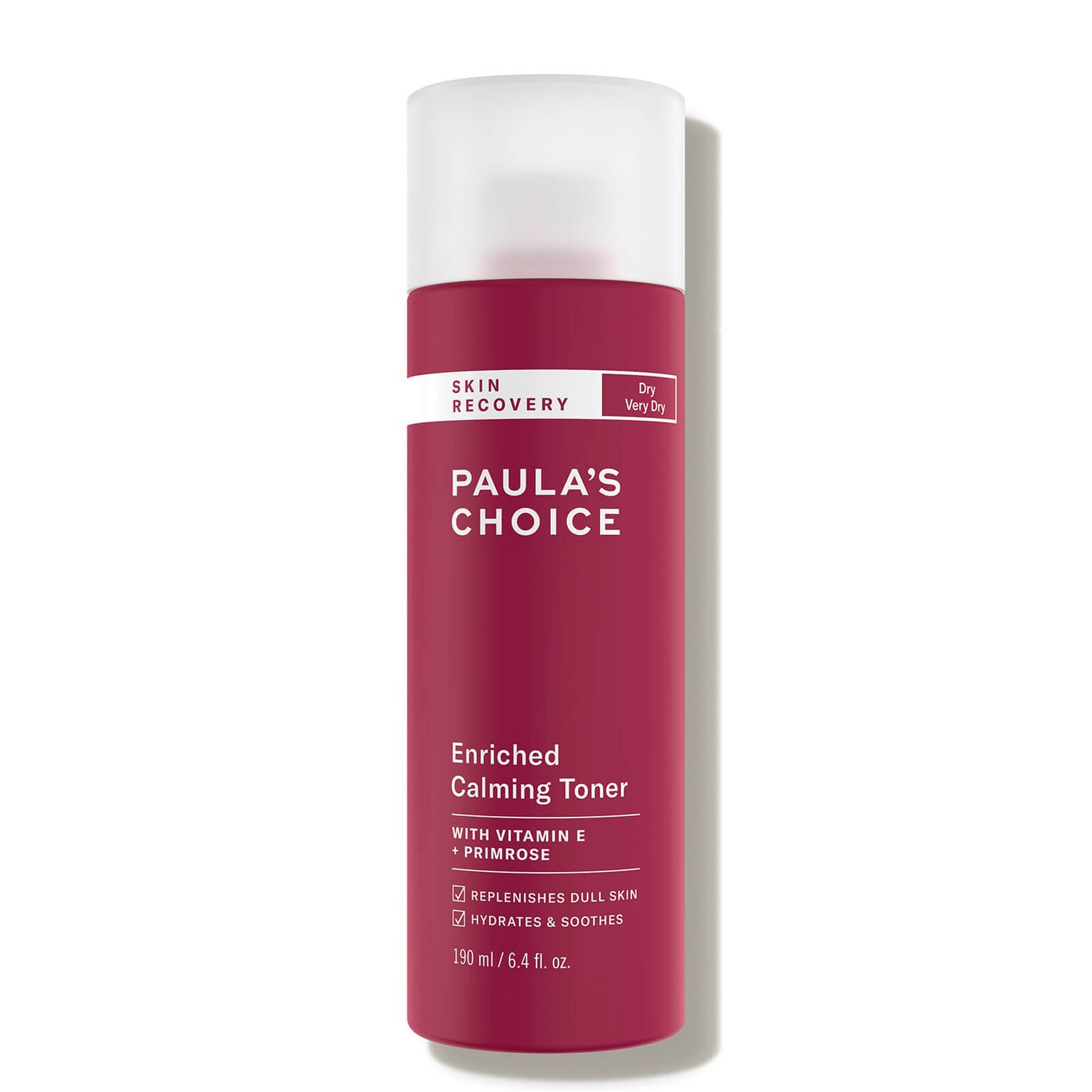
Board-certified dermatologist Dr. Rachel Westbay, MD, FAAD, recommends this toner for sensitive skin, citing its hydrating ingredients that support a strong skin barrier. "This hydrating toner contains essential ingredients that dry, flaky skin requires to improve skin barrier function and help defend against dehydration, environmental stress, and aging," she says. "Key ingredients include hydrating hyaluronic acid, vitamins C and E to provide antioxidant protection against free radical damage induced by both external and internal factors, and borage seed oil to provide an additional boost of antioxidants while simultaneously nourishing and locking in moisture."
Size: 6.4 ounces
Key Ingredients: Hyaluronic acid (hydrating); Vitamins C and E (antioxidant protection); Borage seed oil (eliminates dry, flaky skin)
Skin Type: All
What I Love: Dermatologist-approved; Suitable for sensitive skin; Hydrating; Rich in antioxidants; Calms redness; Comforting milky texture
What I Don’t: Nothing
Customer Review: "In the winter my skin can feel a little sensitive and dry from winter wind, overheated indoor air, and low humidity. When this happens I switch from my usual balancing toner to this. It eases any tightness and flaking. It’s a good hydrating base for my serum and moisturizer." — Dermstore
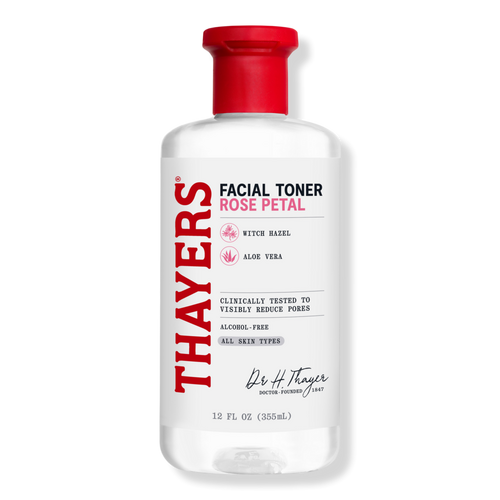
Nothing beats a classic. Well, maybe a classic that costs less than $10 beats a classic. Beloved by so many (it's the toner most of my friends say they use!), Thayers Alcohol-Free Witch Hazel Facial Toner was shown in clinical testing to immediately hydrate skin by 50 percent, visibly improve skin texture by 22 percent, and reduce the appearance of pores by 7 percent.
Size: 12 oz.
Key Ingredients: Witch hazel (soothing); Aloe vera (hydrating); Rose water (tightens pores and controls oil)
Skin Type: All
What I Love: Gentle; Amazing price; Leaves skin feeling clean and balanced
What I Don’t: Rose scent can be divisive (the good thing is it's also available as unscented!)
Customer Review: "This is the first toner that I have ever used. It has great reviews and I can see why. It has definitely helped my skin clear up and has made my pores better. I like the feeling of it after I apply it doesn't feel drying." — Sephora
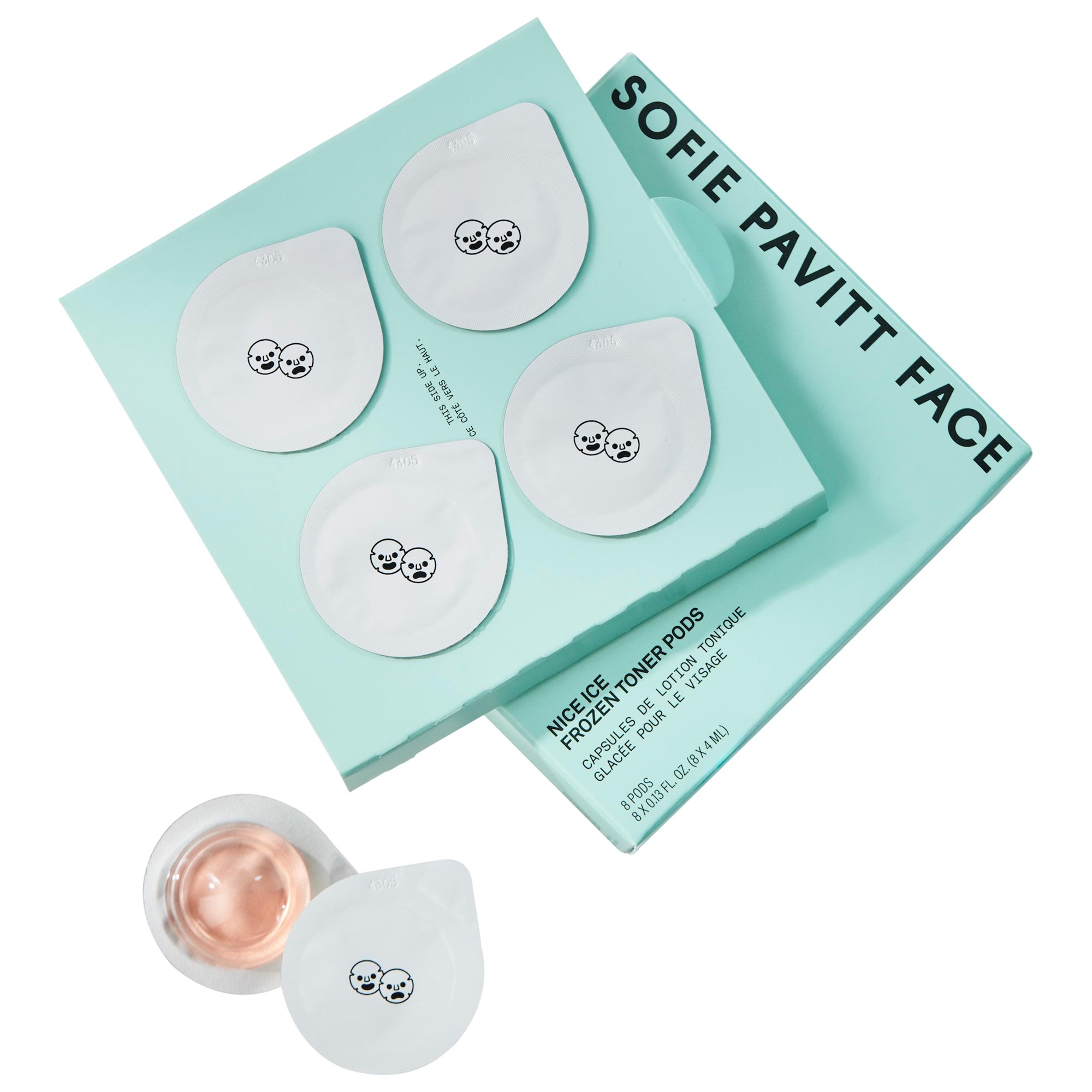
"These little pods remind of when I'd pull ice cubes out of the freezer as a kid and rub them on my face and neck to cool down when it was unbearably hot out—except they obviously provide more skin benefits than that," wrote Marie Claire Senior Beauty Writer Danielle Jackson while discussing her favorite cooling skincare products. "They're made with glycerin and niacinamide, both of which are known for moisturizing and protecting the skin barrier. Just pop them in your freezer for a few hours and rub them across your face with a toning pad after cleansing."
Size: 8 pods/pack
Skin Type: All
Key Ingredients: Niacinamide (brightening and moisturizing); Glycerin (hydrating); Green tea extract and ashwagandha (calming and conditioning)
What I Love: So refreshing; Innovative; Immediate de-puffing effects, as well as all the other good stuff you get from a toner
What I Don’t: Single use only, so you really need to stock up if you want to use these regularly
Customer Review: "I know these are a little pricy for an 8 pack of cubes, but you’re paying for what you get. I have extremely sensitive skin, and this has gotten me through flare ups, winter, pregnancy, and sun burns. Nothing feels better than having a long day and reaching for one of these before bed. It’s like an at home spa experience." — Sephora
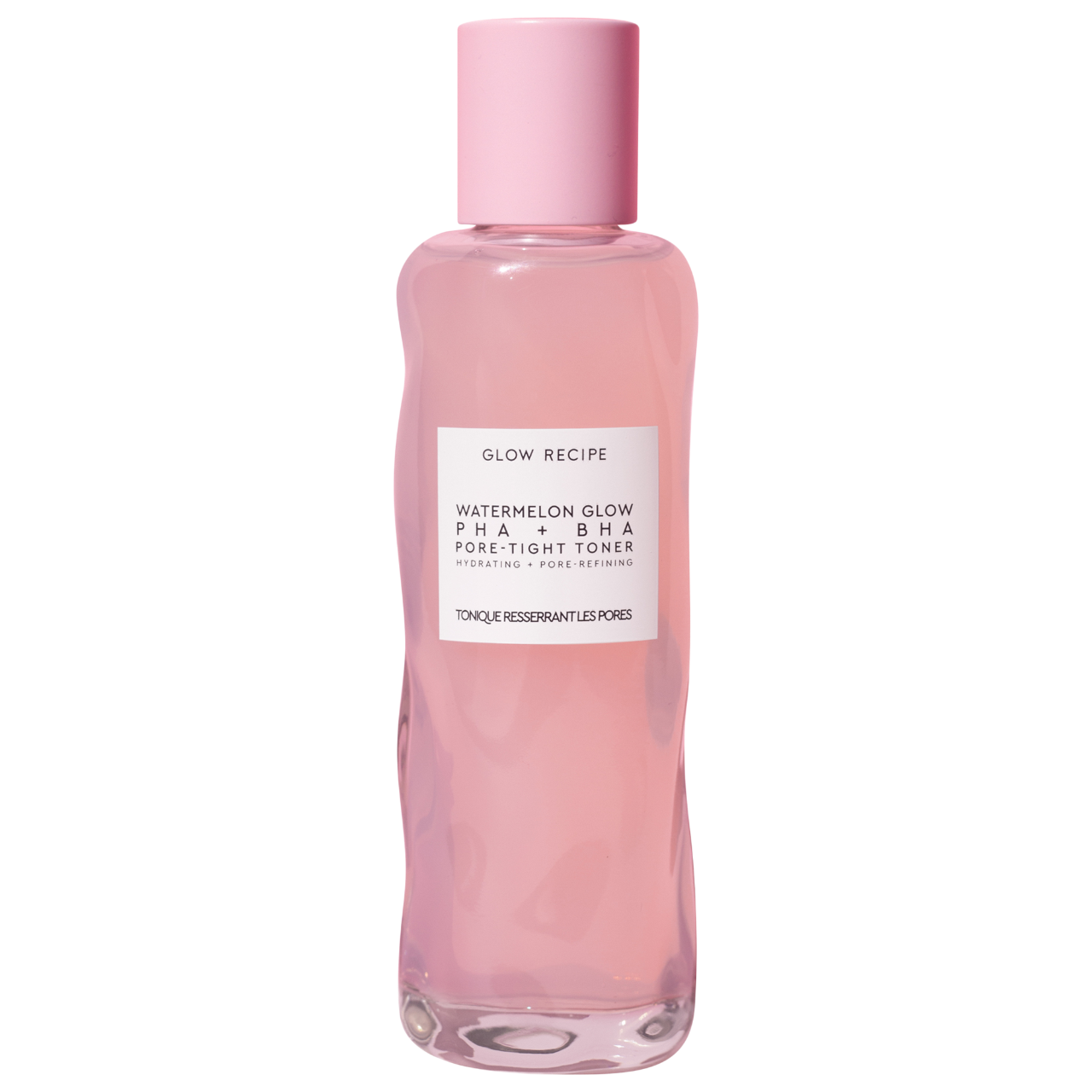
Beta hydroxy acids, or BHAs, are chemical exfoliants known for their ability to reduce both acne and fine lines, which is why Dr. Westbay recommends this formula for those struggling with oily skin. "This toner gets its BHA power from willow bark, a natural form of BHA that works to unclog and decongest," she explains. "These effects are amplified by the addition of polyhydroxy acids (PHAs), which provide gentle exfoliation. Finally, cactus water seals in moisture and prevents moisture loss while simultaneously delivering electrolytes and antioxidants."
Size: 5.07 oz.
Skin Type: All
Key Ingredients: Glycerin (plumping), BHA (decongesting); Watermelon extract and cactus water (hydrating)
What I Love: Dermatologist-approved; Exfoliating; Reduces the appearance of acne and fine lines; Gentle
What I Don’t: The watermelon fragrance is fairly specific and might not be everyone's favorite
Customer Review: "As someone with acne-prone combination skin, this toner is amazing. It does what it says it does and keeps my skin glowing and tight all day, without clogging pores or making excessively oily. Highly highly recommend." — Sephora
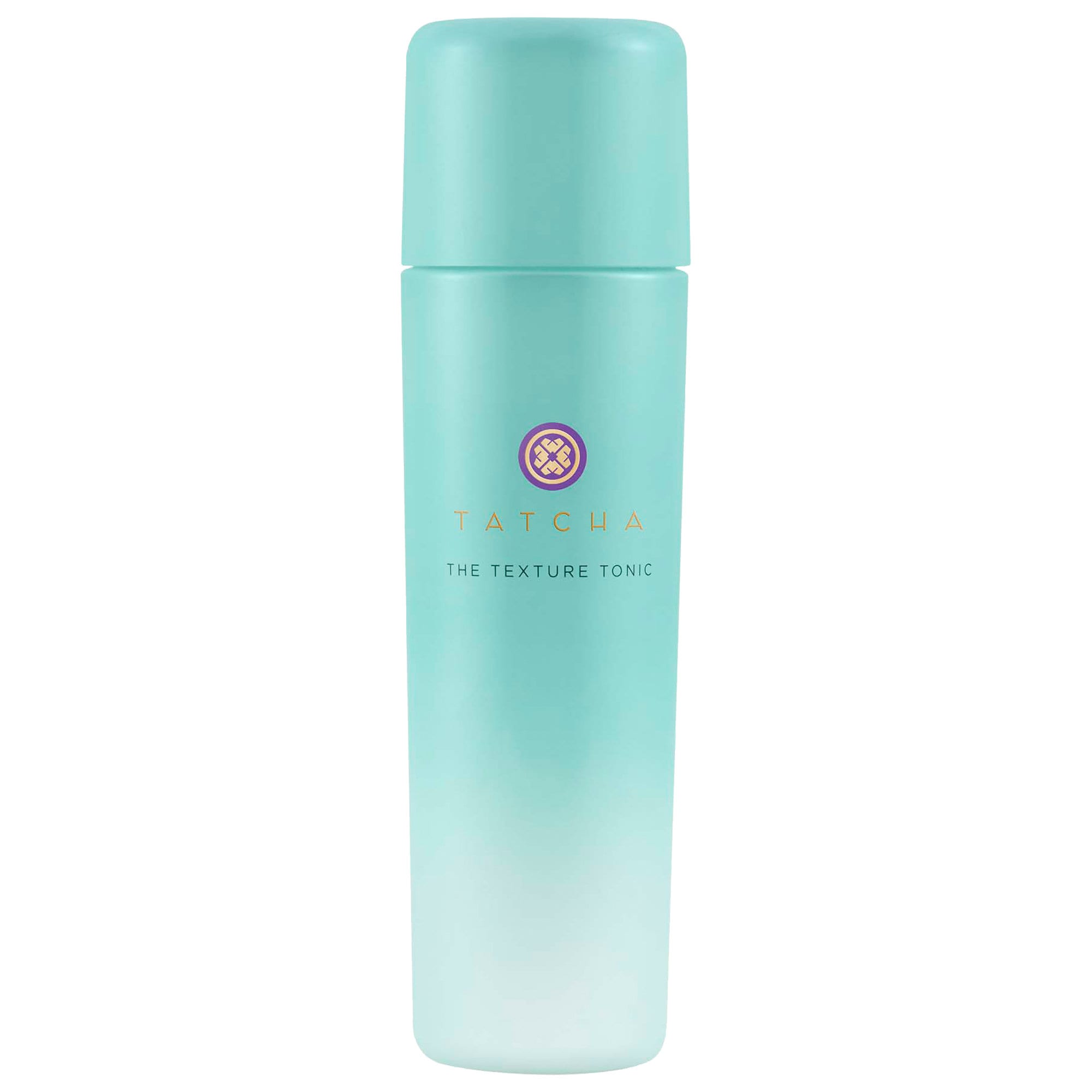
Tatcha's exfoliating toner is made with oily to combination skin in mind. It's infused with fruit-derived AHA, which means that it exfoliates your skin, reducing acne and discoloration. It also contains niacinamide, which reduces the appearance of pores. It's a gentle, fragrance-free way of addressing acne at the root and preventing breakouts from reappearing.
Size: 5.07 oz
Skin Type: Combination; Oily
Key Ingredients: Fruit-derived AHA (gentle exfoliating and resurfacing); Wild rose (minimizes excess oil); Niacinamide (firming)
What I Love: Fragrance-free; Exfoliating; Gentle; Fights acne and prevents future breakouts
What I Don’t: Might be too drying for chronically dry skin
Customer Review: "I've been using this product since June of 2023. I think it’s so good! It makes my skin feel very nice, especially during the winter time and since I'm also on tretinoin, it exfoliates all the dead skin cells away!! I will always repurchase." — Sephora
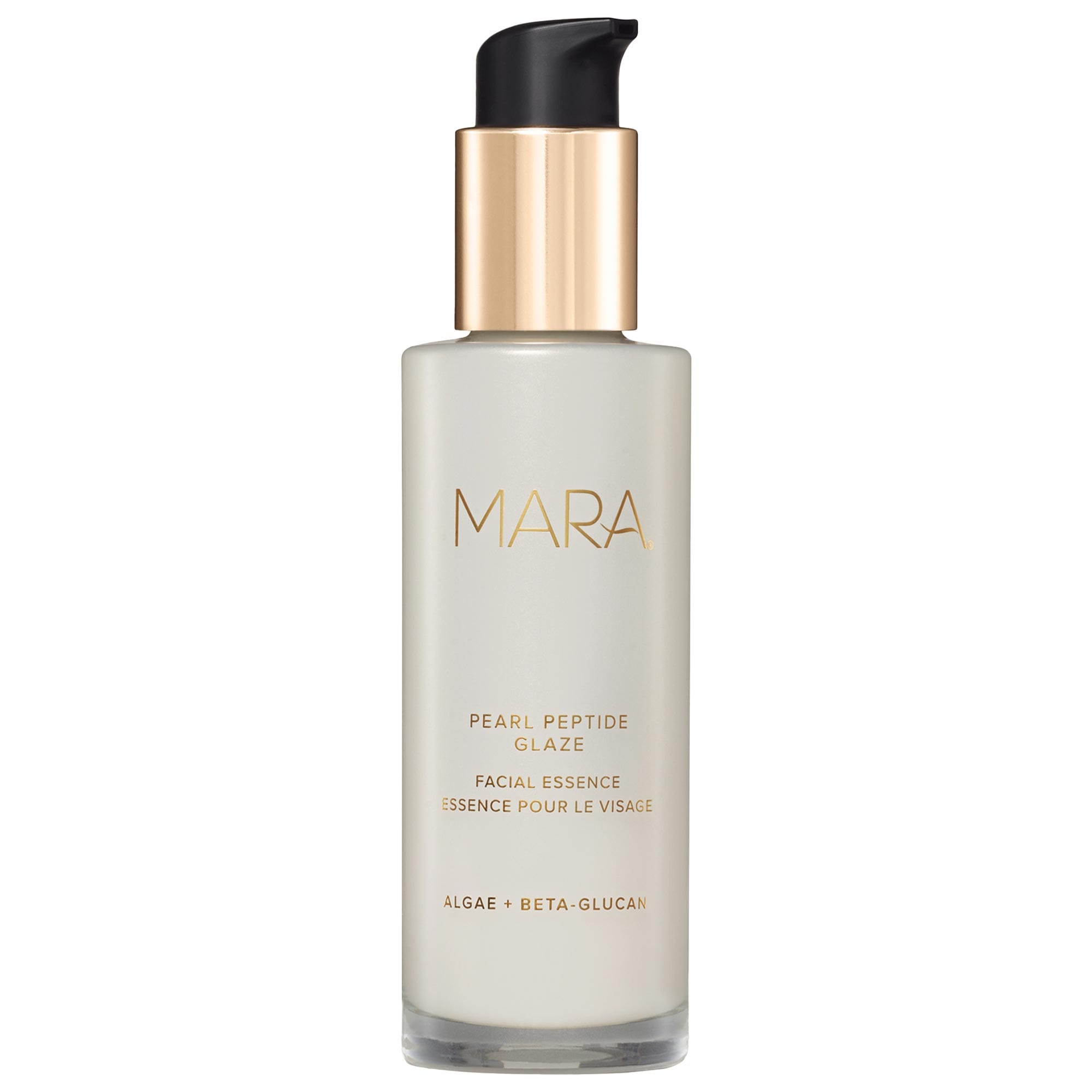
Looking to trim down your skincare routine a little? Mara's beloved three-in-one Pearl Peptide Glaze is an essence-toner-serum that utilizes the brightening powers of pearl powder, algae, and marine collagen peptides to impart your skin with major bounce. The pearlescent bottle is also so pretty to put on display next to your favorite moisturizer.
Size: 3.4 oz
Skin Type: Normal; Dry; Combination; Oily
Key Ingredients: Pearl powder (collagen support); Peptides (moisturizing); Beta glucan (hydrating)
What I Love: Multiple benefits; Leaves skin feeling bouncy; Pretty pearlescent bottle
What I Don’t: Scent is a little perfume-y
Customer Review: "This serum is so hydrating it’s like my skin just drank a huge glass of water. It feels light and refreshing the second I put it on and makes my face look dewy and awake. My foundation goes on way smoother now and looks more natural. One product doing all of that." — Sephora
What to Look for in a Toner
- Ingredients
Board-certified dermatologist Dr. Naana Boakye, M.D., MPH, FAAD loves toners with niacinamide, which "help preserve the skin barrier function and regulate oil production, making it great for all skin types." Board-certified dermatologist Dr. Jeanine Downie, M.D., FAAD, also suggests seeking out ingredients like calendula, chamomile, aloe, or witch hazel, as they can be calming and soothing when the skin is reactive or experiencing irritation or inflammation.
While toners with AHAs and BHAs can be beneficial for those with oily or acne-prone skin, be sure not to overuse them."Look out for super high levels of AHA/BHA and combinations that might—especially if you are using those in other steps of your routine or using retinoids—be way too harsh," explains Dr. Downie. "You can overdo a toner with harsh ingredients and combinations that cause more dermal distress than help. Skin should feel fresh, soft, and smooth. You don't want to feel tight, stinging, raw, spicy, or see red—that is not a good sign."
- Hydration
For those with dry skin, Dr. Boakye advises looking for hydrating ingredients such as hyaluronic acid, which "gives an extra boost of hydration that all skin types can benefit from," glycerin, "a great humectant that will help lock in moisture and prevent moisture loss," and rose water, which "has really great anti-inflammatory properties that will help maintain the skin’s pH balance." Meanwhile, Dr. Westbay says, "Those with rosacea, redness, and/or sensitive skin should look for aloe vera, rose water, and chamomile, which can be soothing and reduce inflammation."
- Reaction
If you're using a toner, your skin should feel refreshed, balanced, and more receptive to the next steps in your routine, never tight or stripped, says Marino.
"Over time, you’ll notice improved texture, clarity, and radiance," she explains. "When clients add a toner to their routine, they often see results quickly. It’s one of the most instantly rewarding products because it addresses surface level concerns while replenishing a dehydrated complexion almost immediately."
What Should I Avoid in a Toner?
Dermatologists recommend avoiding harsh ingredients, such as alcohol, regardless of your skin type. "Alcohol can strip the skin of the natural lipids it needs to support the hydro-lipid barrier, one of the skin's main immune functions," says Dr. Westbay. It can also aggravate acne and irritation because "excessively drying out the skin will cause a paradoxical increase in the amount of oil produced, which can trigger more acne."
She warns that alcohol can be listed as ethanol, denatured alcohol, ethyl alcohol, methanol, benzyl alcohol, or isopropyl alcohol. She also advises avoiding parabens, synthetic dyes, and mineral oils, especially if you have sensitive skin.
Do I Need a Toner?
"The question as to whether toners are necessary continues to be up for debate in the dermatology community," says Dr. Westbay. "Toners were initially created as alcohol-based solutions to balance your skin’s pH and remove residue from traditional facial lye-based soaps."
These days, most dermatologists discourage alcohol-based astringents, and there are a variety of alcohol-free toners available for every skin type and concern, from acne to dryness. But do you need one? Not necessarily!
"Beneficial for some, they are not for everyone—especially if your skin is truly getting what it needs and reacting well, staying balanced, strong and vibrant with the basics," says Dr. Downie. "I always say that the only real requirements are cleansing, antioxidants, and sun protection by day and a hydrator/moisturizer or specialty active by night. You literally do not NEED to do anything else; toner is an 'extra credit' step, if you ask me, when you may already have an A+ routine."
How Do I Incorporate Toner Into My Routine?
Typically, you can keep track of what comes first in your skincare lineup by thinking in terms of "thinnest to thickest."
"The best way to incorporate toner is usually to use a spray bottle and mist the skin, letting it sit or settle," says Dr. Downie. "You can also use a cotton round to move the product across the skin. Being the lightest and smallest molecule as a liquid mist, it is best on freshly cleansed skin before the serum or active step, again why it is important to be mindful of what is in your toner so you don't double down."
Dr. Boakye adds that applying toner after cleansing will create a clean canvas for the rest of your skincare products, "because it removes any excess dirt, bacteria, and grime and helps the products penetrate the skin more effectively."
How Much Toner Should I Use?
While the amount of toner you should use varies from formula to formula, one to two pumps, or a pea-sized amount, should be able to cover your face and neck. Remember that all you need is a thin layer, especially since you'll likely follow up with a serum, moisturizer, and/or sunscreen.
How We Tested
Beauty Writer Sophia Vilensky found the best toners on the market based on customer reviews, Marie Claire editor recommendations, expert recommendations, and her own testing. After receiving samples of numerous toners and returning to some old favorites, she used up countless cotton pads, swiping formulas across her just-cleansed skin and evaluating her discoveries based on formula, scent, price, ingredients, and efficacy.
Why Trust Marie Claire?
For more than 30 years, Marie Claire has been an internationally recognized destination for news, fashion and beauty trends, investigative packages, and more. When it comes to the products Marie Claire recommends, we take your faith in us seriously. Every product that we feature comes personally recommended by a Marie Claire writer or editor, or by an expert we’ve spoken to firsthand.
Meet the Experts

Dr. Rachel Westbay is a board-certified dermatologist who specializes in creating personalized skincare routines for her patients. She practices at Marmur Medical on Manhattan’s Upper East Side and teaches at Mount Sinai, where she was awarded Teacher of the Year.

Dr. Naana Boakye M.D., MPH, FAAD is a board-certified dermatologist and founder of Bergen Dermatology in Englewood Cliffs, New Jersey. A graduate of Temple University and George Washington University, she studied epidemiology and takes a holistic approach when treating her patients.
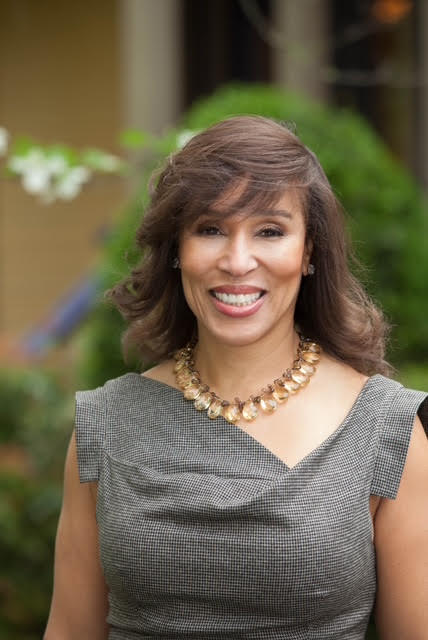
Jeanie Downie, MD, is a board-certified dermatologist and director of Image Dermatology PC in Montclair, New Jersey. She is also an assistant attending physician at Mountainside and Overlook Hospitals.
Dr. Downie has received focused training in various procedures and treatments. This includes courses in cosmetic dermatology, laser, and dermatologic surgery, laser treatments, injectables, chemical peels, laser hair removal, leg vein treatment, SilkPeel, and more. She performs mole removal and skin cancer surgery and has developed a selection of skin care products recognized for superior results.
Dr. Downie is a sought-after lecturer and author of several dozen scientific papers. She has spoken on behalf of some of the American Academy of Dermatology, The Skin Cancer Foundation, the American Society for Dermatologic Surgery, and the Women’s Dermatologic Society. Topics she speaks with expertise include photoaging, skin cancer, cosmeceuticals and injectables, cosmetic dermatology, skin of color, and sun protection. She has also done numerous clinical trials for some of the top pharmaceutical companies.
Dr. Downie proudly serves as an educator for the American Society of Dermatologic Surgery. She has also provided focused training on injectables and fillers and has been a longstanding faculty member on Allergan’s National Exchange Forum.
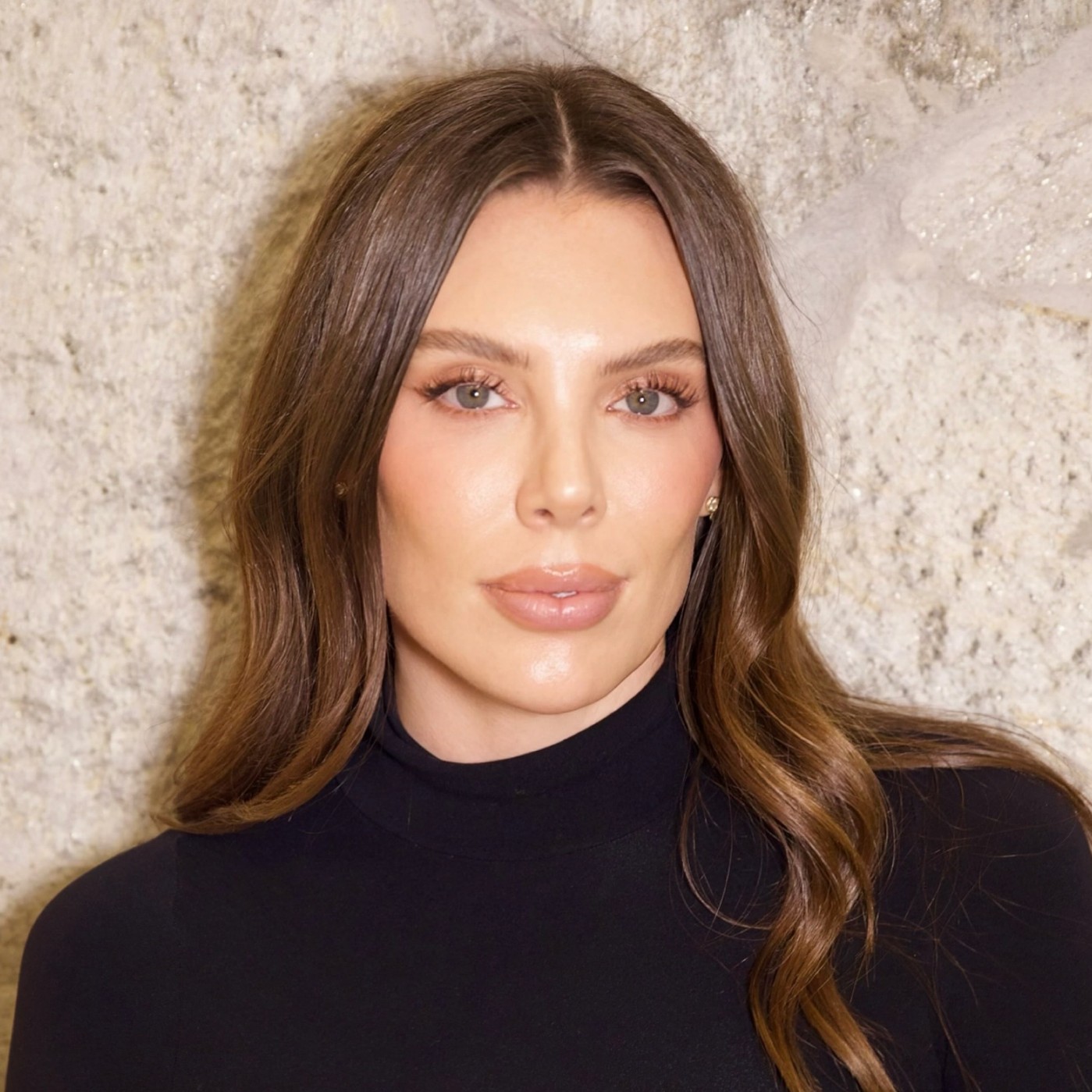
Candace Marino, better known by Hollywood as "The LA Facialist", has been a medical esthetician for over a decade, developing custom complexion protocols and unique techniques for a highly–discerning celebrity clientele.
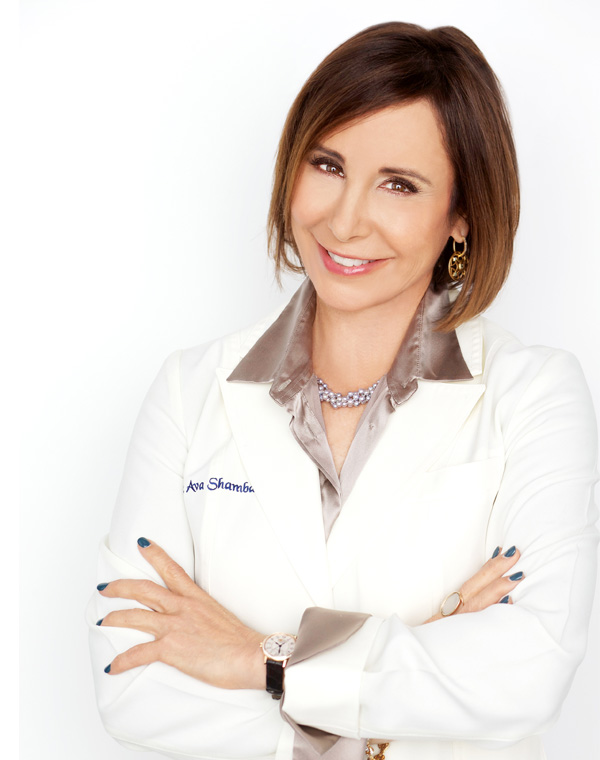
Dr. Ava Shamban is a board-certified dermatologist who believes that appearance and self-esteem are one in the same. She dedicates herself to helping patients worldwide heal their skin to live happier lives. A California native, Dr. Ava graduated magna cum laude from Harvard University and earned her medical degree from Case Western Reserve University School of Medicine. She is currently a member of the ASDS, the AAD and serves on the editorial board for The Journal of Clinical and Aesthetic Dermatology. In addition to her practices in Santa Monica and Beverly Hills, Dr. Ava was also an Assistant Clinical Professor of Dermatology at the UCLA-Geffen School of Medicine. She lectures internationally and serves as a principal investigator on many clinical and FDA trials. She is the author of Heal Your Skin: The Breakthrough Plan for Renewal (Wiley, 2011), makes regular television appearances on CBS’s The Doctors and ABC’s Extreme Makeover, and is a frequently quoted health and beauty expert in magazines all over the world.
Get exclusive access to fashion and beauty trends, hot-off-the-press celebrity news, and more.
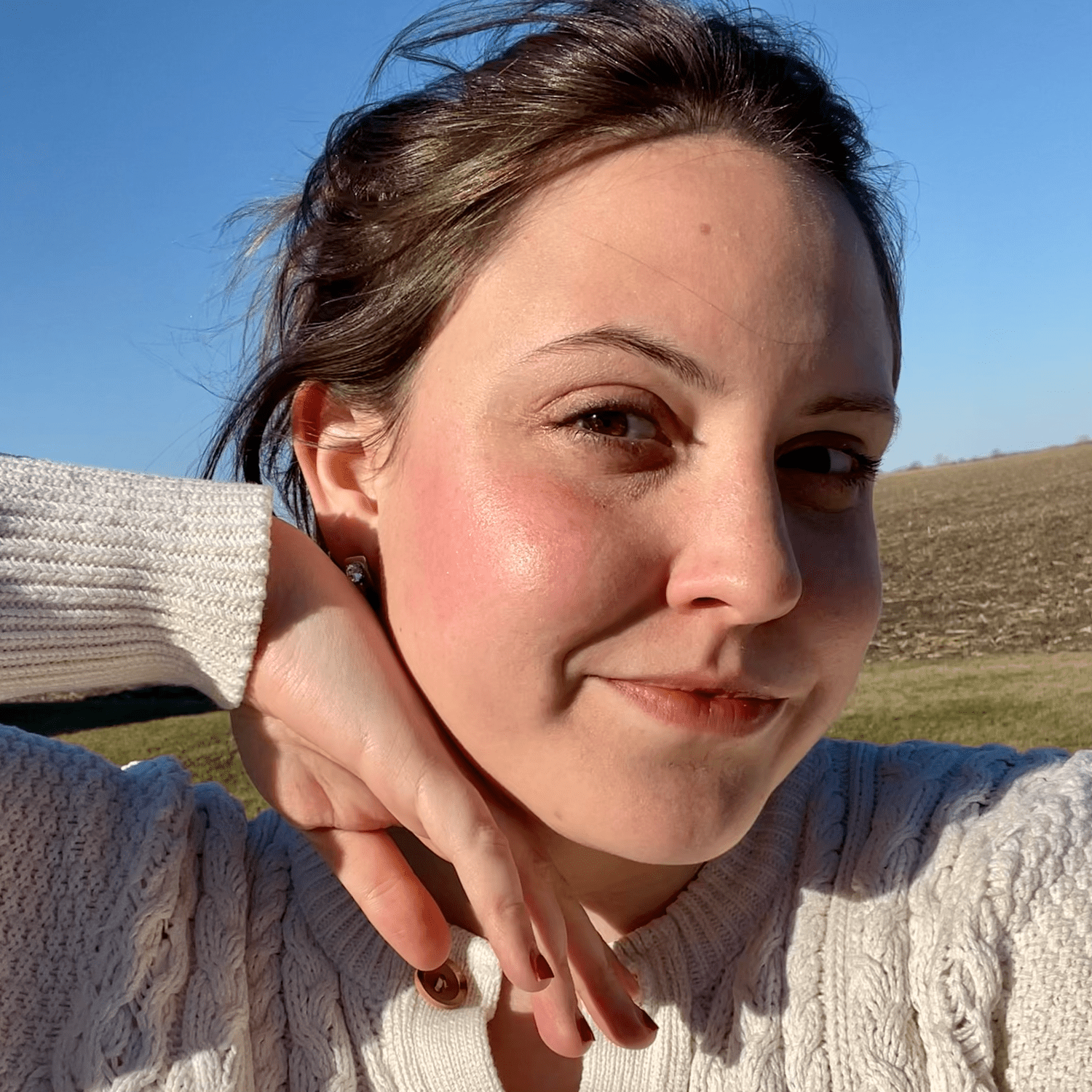
Sophia Vilensky is a Freelance Beauty Writer at Marie Claire with a beauty, wellness, and entertainment journalism portfolio that includes contributions to Byrdie, Bravo, Teen Vogue, and Us Weekly. Growing up in a family of beauticians—and through her own personal studies—she developed an in-depth understanding of aesthetics, cosmetic product formulation, and beauty treatment development and has also held roles as a senior copywriter, content strategist, and proofreader for top beauty and wellness brands. Even so, you'd be hard pressed to find her with her hair and makeup actually done. Sophia is based in Minneapolis and is a 2019 graduate of the University of Minnesota, where she majored in English and minored in cinema studies. During her time at the university, she was the Arts & Entertainment Editor for the Minnesota Daily, earning the 2019 Editor of the Year award for her work. She connected deeply with the Twin Cities arts scene, collaborating with leading beauty professionals, designers, and artists. Graduating Summa Cum Laude, her thesis—a close-reading of Vanderpump Rules—was featured on NPR. When not immersed in writing or testing new products, Sophia enjoys watching reality TV, reading, and exploring the newest woo-woo wellness trends. Keep up with her on Instagram @sophiavilensky.
- Gabrielle UlubayBeauty Writer